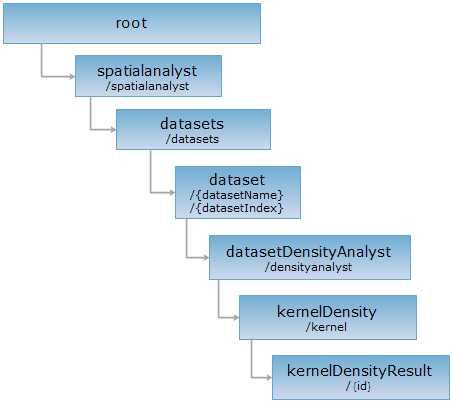URI
<kernelDensity_uri>/kernelDensityResult[.<format>]
Supported methods
Parent resource
Introduction
The resource of analysis on kernel density.
Supported Methods:
- GET: Get the result dataset of analysis on density.
- HEAD: Checks whether kernelDensityResult resource exists, or whether it can be accessed.
Supported output formats: rjson, json, html, xml.
Resource hierarchy

HTTP request methods
Implement the HTTP request on the following URI, where supermapiserver is the server name, with rjson being the output format.
http://supermapiserver:8090/iserver/services/spatialanalyst/datasets/Coastline_L%40Jingjin/densityanalyst/{id}.rjson
GET request
Get the result dataset of analysis on density.
Response structure
The response code would be 200 in a normal situation.
| Field | Type | Description |
| succeed | boolean | Whether the analysis is successful. |
|
message |
String | The message returned while the analysis failed. |
| dataset | String | The identifier of the result dataset. |
| recordset | Recordset | The result recordset used to store spatial object information. |
Response example
Access the kernelDensityResult resource. The rjson format response result after implementing the GET request on http://localhost:8090/iserver/services/spatialanalyst-sample/restjsr/spatialanalyst/datasets/SamplesP@Interpolation/densityanalyst/kernel/6b7fe42a934c49fa93fe5b8b7541d2db_568ab41863944b739a73aae99fac5bfd.rjson is as follows:
{
"dataset": "test@Interpolation",
"message": null,
"recordset": null,
"succeed": true
}
HEAD request
Asks for the response identical to the one that would correspond to a GET request, but without the response body. This is useful for retrieving meta-information written in response headers, without having to transport the entire content. The meta-information includes the media-type, content-encoding, transfer-encoding, content-length, etc.
HEAD request can be used to check if the kernelDensityResult resource exists, or if the kernelDensityResult resource can be accessed by clients. It can also determine if the kernelDensityResult resource supports an output format <format> if performed on a URI with .<format> included.